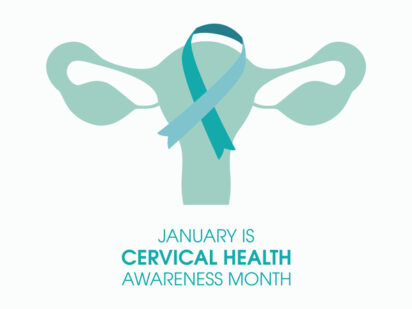What is HPV?
The human papillomavirus (HPV) is the main cause of cervical cancers; at least half of sexually active people will have HPV at some point in their lives. Almost all cervical cancers are caused by HPV. Screening tests and the HPV vaccine can help prevent cervical cancer.
What are risk factors for cervical cancer?
Tobacco smoking and having HIV or other conditions that make it hard for the body to fight off health problems can increase your risk of cervical cancer and other genital cancers. In addition, using birth control pills for a long time, five years or more, can increase the risk of cervical cancer. To reduce the risk of cervical cancer it is recommended that children (male and female)ages 11 to 12 receive the HPV vaccine.
What are ways to reduce risk?
HPV infection can occur in both males and females; it’s recommended to use condoms during sex and to limit your number of sexual partners to reduce risk. Smoking is attributed to higher risk and should be stopped to reduce your risk.
What is the HPV vaccine?
The HPV vaccine protects against the most common cause of cervical, vaginal and vulvar cancers. The vaccine prevents new HPV infections but does not treat existing infections or diseases. It is recommended that even if you receive the HPV vaccine, that you should get screened for cervical cancer regularly.
When should vaccination occur?
If a child is vaccinated before 15, a two-dose schedule is recommended, with them 6 to 12 months apart. For people who start after their 15th birthday, the vaccine is given in a series of three shots. The HPV vaccine also is recommended for everyone through age 26 years if they are not vaccinated already.
What screening options are there?
Two screening tests can help find changes that could become precancer or cervical cancer, the Pap test or the HPV test. The Pap test (or Pap smear) looks for precancers on the cervix to screen for possible cells that may become cervical cancer. The HPV test looks for the virus that causes cells to change. It is recommended that women between the ages of 21 and 29 get Pap test and for women 30 years or older to receive an HPV test, or Pap test, or both together. It is important to continue getting screened for HPV by your doctor, even if you think you are too old to have a child or no longer have sex.
Visit trinityhealth.org/services/womens-health/ to find a specialist that can talk to you about your options for HPV testing.
Information for this is article attributed and obtained from the U.S. Department of Health and Human Services Center for Disease and Control Prevention.

